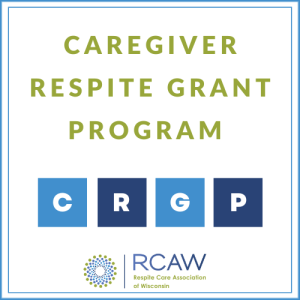Effective April 22, 2025:
Applicants can reapply for the Caregiver Respite Grant Program every 60 days / 2 months

Respite is planned or emergency care provided to a child or adult with special needs in order to provide temporary relief to family caregivers. If you need emergency respite care, please click here.
The number of [family] caregivers increased from 43.5 million in 2015 to about 53 million in 2020, or more than 1 in 5 Americans[i]. Caring for a loved one with disabilities, special needs, or cognitive impairments is a selfless act. However, it’s equally important to remember to care for yourself. The Caregiver Respite Grant Program (CRGP) is here to remind you of your value and the necessity of self-care. You must take care of yourself, too!
The CRGP is designed to be flexible and accessible. It’s available when financial support through other caregiver support or long-term care waiver programs is unavailable or has been exhausted. Depending on funding, caregivers may be able to reapply for this grant a few times a year. Please look at the top of the grant’s webpage for up-to-date information.
Imagine being able to:
- Take a special day with another child in your family for some one-on-one quality time so they feel important and loved.
- Going fishing with a buddy after years of not doing so because caring for your family member requires constant attention.
- Take a few hours to get a massage, run some errands, visit a park, or catch up on some reading.
[i] AARP and National Alliance for Caregiving. Caregiving in the United States 2020. AARP; 2020. Accessed October 14, 2021. https://doi.org/10.26419/ppi.00103.001
Eligibility Criteria
To qualify for the grant, the primary or family caregiver must have a professional (such as an ADRC staff member, Tribal ADRS, or county case manager) complete the Supporting Documentation Form. This form must show that the care recipient meets one of the following conditions:
- Applied for a Long-Term Care Waiver or similar program but will not receive services or approval within 30 days.
- Denied Long-Term Care Waiver support or other respite programs.
- Approved for a Long-Term Care Waiver or respite program but has already used all available funds.
- Receiving other support but needs flexibility for services that current funding does not cover.
Did not apply for a Long-Term Care Waiver because they are not eligible for other supports.
Long-Term Care Waiver & Other Caregiver Supports
Check your eligibility with these programs before applying for the CRGP.
- Children’s Long-Term Care Support (CLTS) (ages birth – 21)
- Children’s Community Options Program (CCOP) (ages birth – 21)
- Care4Kids (ages birth – 21)
- Children with Medical Complexity: Hospitals in Madison, Marshfield, and Milwaukee (ages birth – 26 years old. There are a couple of policy caveats for 21- to 26-year-olds, but they are eligible until then).
- Katie Beckett Medicaid (ages birth – 18)
- Kinship Care (ages birth – 17* limited circumstances may extend up to 21- See Wis. Ch. DCF 58)
- Foster Care Support Services (ages birth – 17* limited circumstances may extend up to 21- See Wis. Ch. 48)
- Family Care (Managed Care Organizations) (age 18+)
- Include Respect I Self-direct (IRIS) (age 18+)
- Independent Living Supports Pilot (age 18+)
- National Family Caregiver Support Program (NFCSP) (Care recipient is age 60 or older – or has Alzheimer’s or other dementia, any age, or Grandparents and relatives age 55+ who are primary caregivers for children younger than age 18.)
- Alzheimer’s Family Caregiver Support Program (AFCSP) (Diagnosis of probable irreversible dementia: Alzheimer’s, vascular dementia, Lewy body dementia, Parkinson’s, and other diseases that include dementia, irreversible MCI, etc.)
- Veteran Services (Veteran or applicant deriving benefits from a Veteran – See Wis. Stat Section 45.02)
Respite Resources
For primary caregivers of children, use this Wisconsin County Contact List to locate and contact your county representative for the CLTS Waiver Program or CCOP services.
For primary caregivers of adults or older adults, use this Wisconsin Aging & Disability Resource Center (ADRC) List to locate and contract your ADRC for the above LTC programs.
Native American Tribal members can contact a Tribal aging and disability resource specialist (ADRS) by visiting the ADRC: Find Your Tribal ADRS.
Please view the user-friendly video below, which explains the step-by-step process for applying for the Caregiver Respite Grant Program.
Instructions on How to Apply
Read the Overview, and Policy and Procedure Document
CRGP Overview, Policy, and Procedure Document
This document explains all of the eligibility requirements, application procedures, and additional resources to help you apply.
***Please note: Eligible applicants must select a respite provider, dates of service, and other specifics, including the total requested amount, before submitting the grant application.
Step 1: Eligibility Criteria Form (ECF)
The family/primary caregiver (applicant) completes the Eligibility Criteria Form.
The form can be found HERE
Step 2: Supporting Documentation Form (SDF)
The ADRC or County submits the Supporting Documentation Form for RCAW Grant
Programs.
The form can be found HERE
Step 3:Link to the Application
RCAW receives and reviews the Eligibility Criteria Form & Supporting Documentation Form, and qualified candidates will be emailed a link to the CRGP application.
The family/primary caregiver (applicant) completes and submits the application; RCAW will notify them if their application is approved via email, with a link to The Grant Report.
Step 4: Grant Report
After the last date of respite, the family/primary caregiver (applicant) must sign The Grant Report, verifying the dates and times of respite care, and RCAW will send the approved grant funds via USPS.
If approved applicants used an agency to provide respite care, you will receive the CRGP Grant Report for Agencies
WANT TO REAPPLY?
Depending on funds, family/primary caregivers may be able to reapply for the Caregiver Respite Grant Program a few times yearly. Please reference our website for up-to-date information.
Applicants must complete the Caregiver Respite Experience Survey to be eligible to reapply.
CRGP Recipient Testimonials








Appeals: RCAW’s board of directors will review CRGP applicants’ disputes if they have been denied a grant application and provide resolution requirements for RCAW. Anyone who wishes to file an appeal must use the Grant Denial Appeal Form.
Grant Program Fraud Statement RCAW funds the majority of its programs with state and federal funds. RCAW is responsible for ensuring funds are used for their intended purpose and in a manner to conduct the goals and objectives identified in the grant. RCAW reserves the right to deny a grant application if it suspects or detects fraudulent information contained on a grant application RCAW also reserves the right to report suspected fraud to the appropriate officials, and applicants will be banned from applying for grants in the future. They may be subject to repayment of said grant funds to RCAW. All parties involved in grant fraud can potentially be charged with government grant fraud. Using state and federal grant dollars for unjust enrichment, personal gain, or other than their intended use is a form of theft, subject to criminal prosecution. Read the Grant Program Detailed Fraud Disclaimer.
MORE QUESTIONS?
If you have any questions about the Caregiver Respite Grant Program, your eligibility, or other resources, don’t hesitate to contact us at [email protected]